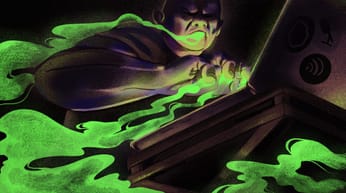
Cantwell Trial Day 3: Nazi tears
Two neo-Nazis break down crying as part of the strangest day yet in an already bizarre federal trial for podcaster Christopher Cantwell.
CONCORD, NEW HAMPSHIRE — The third day of testimony in the federal criminal case against neo-Nazi podcaster Christopher Cantwell was wild. The morning began with the alleged victim, Benjamin Lambert breaking down on the stand while being cross-examined by attorneys representing Cantwell. And if that wasn’t dramatic enough, put on your seat belt and buckle in.
Previous coverage:
- How Christopher Cantwell crumbled
- Cantwell Trial Day 1: Names get named
- Cantwell Trial Day 2: Bowl Patrol under oath
1. For crying out loud
Let me start by saying that I support crying. I support crying by all people. And I don’t think it’s good for anyone to suggest that crying means you’re weak. It means you’re human. Benjamin Lambert, the alleged victim of Cantwell, whose name wasn’t widely known as being attached to the neo-Nazi group known as the Bowl Patrol until this week, began testifying on Wednesday. Lambert is an important witness in the case, albeit a complicated one. And on Thursday, on the witness stand, Lambert broke down in tears.
I’m no lawyer, but it seems logical to assume that prosecuting a case against Cantwell, whom you’re alleging has extorted and threatened someone, would be easiest if the victim was easily viewed by the jury as good and pure: a big, mean neo-Nazi versus an innocent-seeming victim who spends weekends volunteering for causes. That seems ideal. But that’s not remotely this case here. Lambert may have other hobbies, but the one for which he will long be known is his membership in Bowl Patrol.
The defense attorneys attempted to portray Lambert as a man who dished out the same type of internet cruelty as he had received from Cantwell. For instance, if Lambert had been supportive of doxing other people, then maybe the defense could convince the jury that he hadn’t, in fact, felt harmed when Cantwell threatened to dox him.
After defense attorneys finished cross-examination, Assistant U.S. Attorney John Davis approached for redirect — essentially the government’s opportunity to clarify, or undo any damage they perceived may have been done. Davis asked Lambert to clarify. Lambert confirmed that yes, he feels doxing is a serious thing. Davis further asked Lambert if his life had changed since he was doxed. Lambert answered, “Yes.” Davis then asked Lambert to name his favorite sport. “Are you also a hockey dad?” Davis asked. “Yes.” And then Lambert was asked if being doxed had interrupted any plans pertaining to that. “I was supposed to coach my son’s hockey team. Now I can’t do it.” Lambert began to cry, clearly overcome with emotion. Davis confirmed with Lambert that his inability to coach his son’s team is the result of having been identified as a Bowl Patrol member.
I don’t think this makes Lambert deserving of your pity. I also don’t think it makes him deserving of ridicule. Lambert being forced to explain, or be accountable, for the actions of his online persona “CheddarMane,” has got to be brutal. He wrote and posted terrible, terrible things. He associated with and supported terrible, terrible people while they wrote and posted terrible, terrible things. His actions, as a neo-Nazi, put other families at risk. It would be good if Lambert had realized along the way that encouraging and glorifying violence wasn’t a victimless crime. But he didn’t. And so he cried.
2. Paul Nehlen disappoints
Paul Nehlen, the twice failed congressional candidate whose association with the Bowl Patrol was widely known, was called as the next government witness. Nehlen was cagey — at least compared to Lambert — about his association with Bowl Patrol. When asked if he was also known by a nickname, an obvious prompt for him to answer with “Uncle Paul,” the nickname for which he’s long been known, Nehlen instead responded, “A nickname?,” forcing the assistant U.S. attorney to ask whether Uncle Paul was, in fact, his nickname.
When asked if he knew Lambert, the alleged victim, Nehlen confirmed. But Davis went on to ask Nehlen if Lambert was the Bowl Patrol member to whom he was closest. Nehlen answered, “I don’t know what you mean by members.” Nehlen confirmed that he and Lambert met online in 2017 and have been close, visiting each other’s homes. The two are so close, in fact, that Nehlen said, “Ben euphemistically refers to me as dad.”
Nehlen said that he spoke to Lambert on the day prosecutors allege Cantwell extorted and threatened Lambert. And Nehlen confirmed that Lambert didn’t think Cantwell’s messages were a joke.
If you’re expecting a wild ride through Nehlen being asked about all the reprehensible things that have been posted on his Telegram channel, you’d be disappointed. The details offered in Nehlen’s brief testimony were scant.
That said, one interesting tidbit was that Nehlen wasn’t interviewed by the FBI until September 2, less than three weeks before opening statements. And he admitted on the stand that it was after this September 2 meeting that he deleted all but a tiny handful of posts from the Telegram channel he operates.
3. LIVE and uncensored from federal court
After the government called their final witness, an FBI task force officer from the Manchester Police Department, they rested their case. And then, Christopher Cantwell took the stand in his own defense. I don’t know why I was surprised by this. It’s actually the least surprising thing ever.
Picture this: Cantwell’s podcast, “Radical Agenda,” but instead of Cantwell sitting in front of computer monitors surrounded by weird flags, photos of Trump, and guns, he’s sitting in front of a jury of twelve, surrounded by FBI agents, attorneys, and me.
Cantwell’s answers were as conversational as they were meandering. He started by testifying about the basics. When asked by his defense attorney to describe his employment history prior to, uh, however we are describing what he currently does, Cantwell testified that he was an “IT guy.” When asked if he had any training in that area, a question clearly designed to elicit the name of a school or training program, he answered: “I learned IT the way I learn all things — the hard way.” It was Cantwell being Cantwell.
Early on in his testimony, Cantwell turned to the jury and said, “A podcast, for those who don’t understand —” before devolving into something about RSS feeds. He later referred to the social messaging app Telegram, explaining to the jury, “Lots of people have a Telegram. It’s almost like saying you have a telephone.”
When asked to describe the “Radical Agenda” podcast, defense attorney Eric Wolpin asked Cantwell if the show was at times shocking. (“Shocking is pretty much the whole entire point of it.”) If it included racist or homophobic content. (“Yes.”) If it included swearing. (“Oh yeah.”)
After Cantwell offered an unsolicited rant about being deplatformed, Wolpin shifted gears, asking Cantwell how he came to know the Bowl Patrol. Cantwell said several Bowl Patrol members joined his “Radical Agenda” Telegram chat in late 2017 or early 2018, and then offered some compliments of the group. (His attorneys have spent much of the week trying to paint the group as dangerous, accelerationists.)
“The Bowl Patrol was talented. They were talented guys,” Cantwell testified, commenting briefly on their impressive Photoshop skills and — for some reason — alerting the jury to be on the lookout for hearing the word Photoshop used as a verb.
“They were useful for a period of time,” Cantwell testified. “Initially, it was funny. But it started to get downright scary.”
While the Bowl Patrol promoted violence toward law enforcement, Cantwell assured the jury that he encouraged his listeners to have a good relationship with “the cops.”
Cantwell testified that members of the Bowl Patrol came to believe he was “a sell-out.”
He said he was subject to a “never-ending torrent of nonsense” that included prank phone calls and memes that he was certain were the work of his former Bowl Patrol friends. How was he so certain? “The style of image editing,” he testified.
At this point, the jury got to hear about a minute from a compilation of random prank calls to “Radical Agenda,” none of which could be attributed to the Bowl Patrol, and some of which weren’t even identifiably prank calls.
The Judge explained to jurors that the compilation “goes on longer than I want you to hear.” (Earlier, without the jury, the judge told Cantwell’s attorneys that the compilation was “gobbledygook” and said, “We don’t need a transcript because it would be unintelligible.”)
Cantwell then began testifying about the plight of being a one-man show challenged by these pranksters. At one point, he described having emailed a burner phone app company to explain that “You have a white supremacist terrorirst group using this to harass people.”
Cantwell testified that his website was “defaced with grotesque sexual imagery and things that were unflattering of your humble correspondent,” a reference to the posts Cantwell said were made by “Vic Mackey,” the Bowl Patrol leader to whom Cantwell said he gave posting privileges.
After attempting to contact the FBI by phone about the website, Cantwell said he was placed on hold too long and decided instead to file something with the Internet Crime Complaint Center, which is run by the bureau.
According to portions of the complaint that were read to the jury, Cantwell told the FBI his “website was defaced with terrorist propaganda and pornography last night … including bestiality.”
Cantwell told the FBI that Bowl Patrol was responsible, and then posted on the social networking site Gab that he had, in fact, reported the “crime” to law enforcement.
His reasons for openly posting about going to law enforcement, Cantwell testified, were twofold. First, he hoped doing so might have a “deterrent effect.” Second, Cantwell testified: “I don't want people to think I’m doing so surreptitiously. When I work with law enforcement, which I’ve done on numerous occasions, I do so openly.”
“The label of being a snitch is something I tried to avoid by telling people that I spoke to law enforcement,” Cantwell said.
When the FBI didn’t respond to Cantwell’s complaint, he sought out a Keene police sergeant with whom he said he has a “pretty good relationship” and, for whom, I feel very sorry.
Cantwell said he has regularly reported threats to the Keene Police Department, testifying: “I refer them when they talk about violence. If they say, ‘I wanna fight you,’ I will send it [to the police].”
In May 2019, the Keene police told Cantwell it would be best to get the FBI involved.
Cantwell explained how his girlfriend at the time, who used the alias “Peach,” had traveled to the Missouri home of CheddarMane, and had taken photos at the home, including one of Ben Lambert. Peach later supplied additional photos and Lambert’s address to Cantwell, which the government alleges he used to threaten and extort Lambert into giving up information on Vic Mackey.
When asked by Wolpin to explain his relationship with Peach, Cantwell began crying.
“I asked (her) to marry me,” he said.
Cantwell continued crying as he read aloud excerpts from the messages at the center of the alleged crimes:
“So if you don’t want me to come and fuck your wife in front of your kids, then you should make yourself scarce.”
“I bet one of my incel listeners would love to give her another baby.”
Cantwell continued crying as he described how and why he chose to write those two messages to Lambert. The messages, Cantwell explained, were designed to be “profoundly unpleasant.”
4. Get ready for Friday
On Friday, Cantwell is set to continue his testimony. He will also likely be cross examined by prosecutors. One can only imagine what we will hear next.
Hilary Sargent is a freelance journalist. She has written for The New York Times, QUARTZ, The Boston Globe, and The Wall Street Journal. Follow her on Twitter at @lilsarg.
Illustration by Colleen Tighe.
If you value this work, please be sure to tell a friend or colleague about it and encourage them to sign up. Feeling generous? You can also give someone a gift subscription to The Informant.
Subscribe to The Informant to receive the latest updates.





